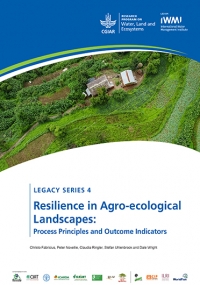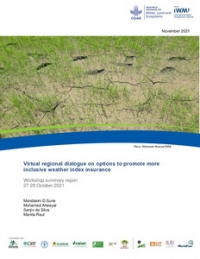Activity description: This project activity ‘Managing ecosystem services for food security and the nutritional health of the rural poor at the forest-agricultural interface’, also called ASSETS, was established with the aim to document the relations between ecosystem services, food security and the nutritional health of local communities living in the forest-agriculture interface. ASSETS is interdisciplinary by nature, including the use of participatory methods, household and dietary surveys, modeling, economic valuation and risk analysis, aimed at investigating three major research themes: i) Drivers, pressures and linkages between food security, nutritional health and ecosystem services; ii) Crises and tipping points involving past, present and future interactions between food insecurity and ecosystem services at the forest-agriculture interface; and iii) The science-policy interface. The project initiated in 2013 with field data collection in Colombia (Amazon department), and will continue in 2015 with data collection in Peru (Ucayali region) and analysis of results. In 2015, the project team will carry out focal groups and household surveys to understand the interactions between ecosystem services and, food security and nutritional health for the rural communities; This activity has a complementary sub-activity entitled “Impact Assessment Study on the effects of land use changes occurred in the past decade on household well-being and ecosystem Services in the Ucayali Region, Peru (Amazon region)”. This activity complements the three major research themes mentioned above with an impact assessment of the past land use changes in the region on ecosystem services, food security and livelihoods. Today, the landscape in upland communities of the Peruvian project site has been strongly affected by land use change: along the main road and its ancillary, oil palm cultivation stretches for miles, interrupted by pasturelands and cacao plantations in suitable areas. This sub-activity aims to understand the agriculture, livelihood, and ecosystem use changes that have occurred in mestizo communities partly due to oil palm cultivation, which started as a development plan to reconvert coca production and has subsequently grown in the past decade as a profitable, albeit heavily subsidized, business. Given the strong political interest in oil palm cultivation at the national and local level, our objective is to inform policy makers on the changes that the promotion of oil palm monoculture has brought about in the Ucayali region and provide recommendations for the future development of this crop taking into account the changes in household wealth, dietary quality and diversity, and in their relationship with the ecosystem, which ultimately affect their ability to achieve long-term resilience and inclusive well-being. This activity will answer three research questions: 1) What are the changes in agricultural and livelihood diversity occurred in the past thirteen years and what is the role played by oil palm cultivation in contributing to these changes? (2015-2016) 2) Has use of and dependency from the ecosystem changed because of the conversion of land to oil palm cultivation? (2015-2016) 3) Are the changes in income, wealth, diets, use of ecosystem services and vulnerability to shocks different among farmers who have converted land to oil palm plantations more recently and those who have been oil palm growers for longer, living in areas where landscapes have been strongly modified by oil palm cultivation? (2015-2016)
menu





/index.jpg?itok=EzuBHOXY&c=feafd7f5ab7d60c363652d23929d0aee)









